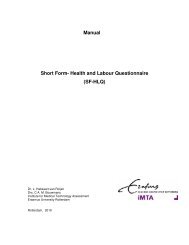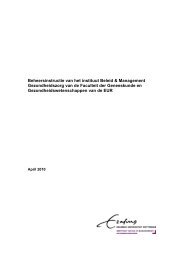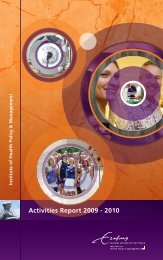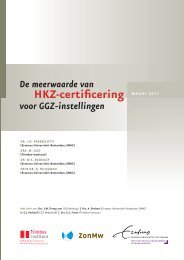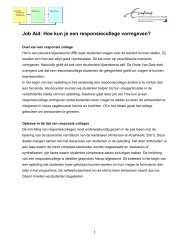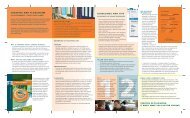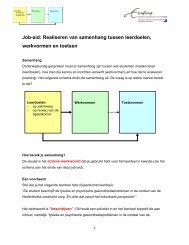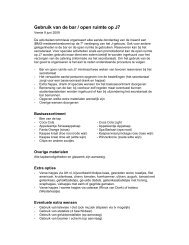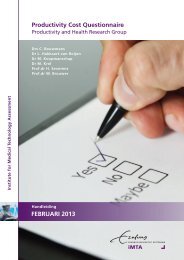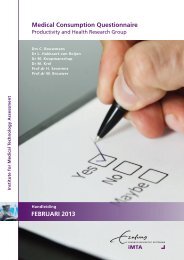62Chapter 44.4 DISCUSSIONIn this paper, we have been concerned with the HRQoL of survivors of ARM andCDH in a long-term setting. Many of them appeared to retain substantial residualsymptomatology. Compared with reference data, the HRQoL of the patients(especially those with ARM) aged 1–4 was poor. In the patients aged 16 yearsand over, hardly any differences with the general population were found. It mustbe stressed that the relatively poor outcomes in the youngest patients are notoffset by the encouraging outcomes in adult life. This stage of life has its owninherent importance for the developing individual. Therefore, future researchshould especially be targeted at finding ways to improve the HRQoL of theyoungest children. It is clear from the current study that the relations betweensymptoms, impairments, limitations in functioning, and HRQoL should beinterpreted with caution. An important lesson to be learned is that impairmentsare imperfect predictors of HRQoL. Not every impairment automatically triggers adecrease of the HRQoL.The HRQoL of the ARM patients aged between 1 and 4 years was statisticallysignificantly lower than population standards predicted, even though complaintsof incontinence are not prominent until patients grow older. Their HRQoLimproved considerably with growing age, notwithstanding the fact that stooldifficulties are widely believed to disrupt HRQoL due to pain, feelings of shame, orinability to take part in social activities such as sports. A possible explanation isthat diapers, therapeutic aids such as enemas, and dietary manipulations areeffective tools in restoring satisfying functioning. Seemingly, the patients are ableto cope successfully with their handicaps in one way or another.A HRQoL questionnaire did not reveal a pronounced difference in the lung domainbetween CDH patients aged 1–4 years and a reference group. In a sense, theseresults are consistent with earlier research we performed in this specific patientgroup (median age 11.7 years) using lung function tests. 12 This study showedthat in the long term no severe pulmonary impairment resulted from CDH. Thereduced level of cognitive functioning in the CDH patients aged 5-15 years (nonetreated with ECMO) corroborates a small scale study previously carried out in ourhospital. 20 In the current study, from a certain age the HRQoL of the CDH patientscould hardly be distinguished from that of the general population. Oneexplanation is that, particularly in the past, a major 'selection' took place in thefirst week of life due to the high mortality in patients with severe pulmonaryhypoplasia and therapy resistant pulmonary hypertension. In other words, thosepatients in the worst shape are likely not to have survived. Finally, it should benoted that, while ECMO improves survival in selected, critically ill infants withCDH, 21 it is also true that the ECMO technique enables us to keep some patientsalive with a relatively poor prognosis and that it may lead to iatrogenicmorbidity. 22 Thus, close follow-up of CDH patients becomes even more essentialin the future.
Short-Term and Long-Term Health-Related Quality of Life after ARM and CDH 63When evaluating the outcome of ARM and CDH, we did not include the patientswho had died. Although it is of major importance to critically evaluate thedeaths—as was done earlier in our pediatric surgical department 23,24 —this wasbeyond the scope of the current study. Here, we concentrated on assessingwhether improved survival in neonatal surgery comes at the expense of poorHRQoL. Apart from that, 78% of the 54 deceased ARM patients died within theirfirst year of life, with a median life span of 23 days. Of the 86 CDH patients whodied, 87% died within their first year of life (median life span 3 days). The vastmajority of the deceased were therefore too young to assess the quality of theirlives. Similarly, we did not assess patients who were severely cognitivelydisabled. Cognitive disability, which is attributable to a wide variety of underlyingcauses ranging from birth asphyxia to severe chromosomal anomalies (includingtrisomy 21), is not common in these patient groups. Only 1.8% of all eligiblepatients had to be excluded for this reason (n = 15; mean age 24.6 years). Asolid investigation into the HRQoL of this subgroup would have been difficult toaccomplish within the current study. HRQoL can be assessed by proxy in thesesubjects, but one must seriously doubt whether the measures used would besufficiently valid and reliable in these cases. The severely cognitively disabledpatients may differ in their perception of HRQoL, and their ability to express theirexperiences is often very limited. This may reduce the parents' or caregivers'ability to make accurate judgments about aspects of the patient's HRQoL.Assessment of HRQoL in children poses special problems. Because of difficultiesthat small children have with notions of abstract concepts and language, we hadto rely on proxies. We are conscious of the variety of factors that can influence aparent's rating of his or her child's HRQoL and the equivocal findings reported inthe literature. 25-27 Nevertheless, recent research findings in children 28-30 suggestthat a parent is able to report appropriate information regarding his or her child'sHRQoL, especially concerning observable behaviors. There is as yet no clearevidence of whether—when the parent and the child disagree—the parents overorunder-estimate HRQoL. A number of studies indicated that parents tend to ratethe child as having a poorer HRQoL than the child does him or herself, a tendencywhich would result in a conservative estimate of the HRQoL. 31-33 These studies,often concentrating on acquired conditions, apply, however to children agedbetween about 7 and 13, who are able to give self reports, while our study alsocomprised younger children. Finally, as in most previous studies in this area, welimited ourselves to one source of information and did not obtain additional viewsof, for example, other relatives or teachers. Yet, the use of proxies other thanparents may have value and merits further investigation.In conclusion, our investigation into the HRQoL of survivors of ARM and CDHprovides favorable results. The suggestion that improved survival can only bereached at the price of poor HRQoL is not substantiated. As expected a priori,ARM and CDH can cause considerable symptomatology. Nevertheless, the vastmajority of the patients ultimately enjoy healthy lives.
- Page 3:
COST-EFFECTIVENESS OF NEONATAL SURG
- Page 6 and 7:
DOCTORAL COMMITTEEPromotors:Prof.dr
- Page 9 and 10:
PUBLICATIONSChapters 2 to 7 are bas
- Page 11:
6ChapterINFORMAL CARE FOR CHILDREN
- Page 14 and 15:
2Chapter 11.1 BACKGROUND AND MOTIVA
- Page 16 and 17:
4Chapter 1provides a good overview
- Page 18 and 19:
6Chapter 1disability, and death of
- Page 21:
Introduction 9particular equity pri
- Page 25 and 26: Introduction 1320. Oostenbrink JB,
- Page 27 and 28: Introduction 1554. Heyman MB, Harma
- Page 29 and 30: THE COST-EFFECTIVENESS OFTREATMENT
- Page 31: Cost-Effectiveness of Treatment for
- Page 35 and 36: Cost-Effectiveness of Treatment for
- Page 37 and 38: Cost-Effectiveness of Treatment for
- Page 39 and 40: Cost-Effectiveness of Treatment for
- Page 41 and 42: Cost-Effectiveness of Treatment for
- Page 43 and 44: Cost-Effectiveness of Treatment for
- Page 45: Cost-Effectiveness of Treatment for
- Page 48 and 49: 36Chapter 3ABSTRACTBackground/Purpo
- Page 50 and 51: 38Chapter 33.2 MATERIALS AND METHOD
- Page 52 and 53: 40Chapter 3child's date of birth) a
- Page 54 and 55: 42Chapter 3diaphragm was closed (Ta
- Page 56 and 57: 44Chapter 3Total costs of treatment
- Page 58 and 59: 46Chapter 3Regarding the treatment
- Page 60 and 61: 48Chapter 3REFERENCES1. Stolk EA, P
- Page 62 and 63: 50Chapter 332. Jaillard S, Pierrat
- Page 64 and 65: 52Chapter 4ABSTRACTAims:To examine
- Page 66 and 67: 54Chapter 4Outcome measuresThe pati
- Page 68 and 69: 56Chapter 4Clearly, the symptoms st
- Page 70 and 71: 58Chapter 4The respondents did not
- Page 72 and 73: 60Chapter 4Table 4.4TAIQOL Scores o
- Page 76 and 77: 64Chapter 4ACKNOWLEDGMENTSWe are in
- Page 78 and 79: 66Chapter 418. Coons SJ, Rao S, Kei
- Page 80 and 81: 68Chapter 5ABSTRACTObjective:Extrac
- Page 82 and 83: 70Chapter 5treatment. 26,27 Finally
- Page 84 and 85: 72Chapter 5CostsOnly direct costs w
- Page 86 and 87: 74Chapter 5summarized in Table 5.2.
- Page 88 and 89: 76Chapter 5Table 5.3 Direct Medical
- Page 90 and 91: 78Chapter 5Figure 5.3 illustrates o
- Page 92 and 93: 80Chapter 5severely ill newborns—
- Page 94 and 95: 82Chapter 5REFERENCES1. Bartlett RH
- Page 96 and 97: 84Chapter 533. Meinert CL: Extracor
- Page 98 and 99: 86Chapter 568. Hui TT, Danielson PD
- Page 100 and 101: 88Chapter 6ABSTRACTObjective:To inv
- Page 102 and 103: 90Chapter 6a rule. The health-relat
- Page 104 and 105: 92Chapter 6Regression analysis of h
- Page 106 and 107: 94Chapter 6that caregiving for thei
- Page 108 and 109: 96Chapter 6Table 6.5 CareQol Compar
- Page 110 and 111: 98Chapter 6children with a disabili
- Page 112 and 113: 100Chapter 6This study was of impor
- Page 114 and 115: 102Chapter 618. Poley MJ, Stolk EA,
- Page 116 and 117: 104Chapter 654. Boman KK, Viksten J
- Page 118 and 119: 106Chapter 7ABSTRACTMortality rates
- Page 120 and 121: 108Chapter 77.2 THE RELEVANCE OF CO
- Page 122 and 123: 110Chapter 7In the early 2000s, our
- Page 124 and 125:
112Chapter 7Table 7.1 Economic Eval
- Page 126 and 127:
114Chapter 7More from a policy pers
- Page 128 and 129:
116Chapter 7also expect that life-s
- Page 130 and 131:
118Chapter 7entirely justified, for
- Page 132 and 133:
120Chapter 723. Sydorak RM, Nijagal
- Page 134 and 135:
122Chapter 765. Glaser AW, Davies K
- Page 137 and 138:
GENERAL DISCUSSION:A GUIDED TOURPRO
- Page 139 and 140:
General Discussion: A Guided Tour P
- Page 141 and 142:
General Discussion: A Guided Tour P
- Page 143 and 144:
General Discussion: A Guided Tour P
- Page 145 and 146:
General Discussion: A Guided Tour P
- Page 147 and 148:
General Discussion: A Guided Tour P
- Page 149 and 150:
General Discussion: A Guided Tour P
- Page 151:
General Discussion: A Guided Tour P
- Page 154 and 155:
142GlossaryCharge (or: tariff)A pri
- Page 156 and 157:
144Glossaryefficient one. We are th
- Page 159 and 160:
SUMMARY
- Page 161 and 162:
Summary 149mortality. Finally, it i
- Page 163 and 164:
Summary 151neonatal surgery. It is
- Page 165 and 166:
SAMENVATTING
- Page 167 and 168:
Samenvatting 155zoals directe niet-
- Page 169 and 170:
Samenvatting 157Hoofdstuk 6 gaat ve
- Page 171:
Samenvatting 159vereisen, waarvoor
- Page 174 and 175:
162AcknowledgmentsAlthough I am ind
- Page 176:
About the AuthorBorn in De Meern (N



